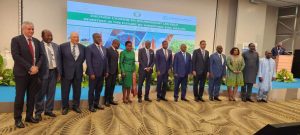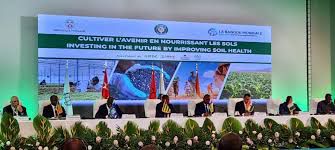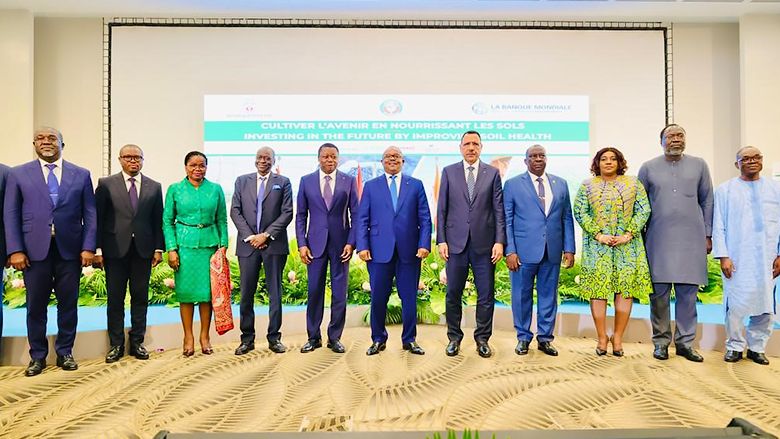
LOME, May 31, 2023 – Heads of State and ministers from West Africa and the Sahel have reaffirmed their commitment to accelerating investments and reforms aimed at making fertilizers more accessible and affordable. This commitment was made during a high-level roundtable organized by the Togolese government, the World Bank, and the Economic Community of West African States (ECOWAS).
Country delegations, including President Faure Essozimna Gnassingbé of the Republic of Togo, President Mohamed Bazoum of the Republic of Niger, and President Umaro Sissoco Embalo of Guinea Bissau, as well as ministers of agriculture and finance, endorsed a roadmap on soil health.
President Faure Essozimna Gnassingbé emphasized the importance of having a vision and strategy for the proper balance and effective utilization of fertilizers. He expressed his support for a regional approach and emphasized the need for planning and state involvement in agricultural transformation.

The event saw the participation of industry leaders, development partners, and representatives from the Economic Community of West Africa Agricultural Policy (ECOWAP), who reiterated their commitments to the development of an innovative and integrated approach for sustainable soil fertility management.
Ousmane Diagana, World Bank Vice President for Western and Central Africa, highlighted the commitment of the World Bank Group to increase financial and technical support for resilient agriculture and food security. He announced an additional $1.5 billion in funding by 2024, bringing the total commitment to $5.5 billion. The Netherlands also pledged €100 million to support the fertilizer sector in West Africa over the next decade.
Dr. Omar Alieu Touray, President of the ECOWAS Commission, emphasized that the adoption of a common roadmap by ECOWAS countries would improve access to fertilizers for smallholder farmers, ensuring food security and sovereignty.
The Lomé roundtable was attended by leaders from Benin, Burkina Faso, Cabo Verde, Chad, Côte d’Ivoire, Gambia, Ghana, Guinea, Guinea-Bissau, Liberia, Mali, Mauritania, Niger, Nigeria, Senegal, Sierra Leone, and Togo.

Representatives from regional development partners, including the West African Economic and Monetary Union (UEMOA), the Permanent Interstate Committee for Drought Control in the Sahel (CILSS), the International Fertilizer Development Center (IFDC), as well as fertilizer industry leaders, were also present.
In a bid to strengthen agricultural and food systems’ resilience, regional leaders approved a declaration outlining concrete objectives and measures:
Tripling fertilizer consumption and doubling agricultural production by 2035 through an integrated approach to land management and soil health restoration.
Urgently improving access to mineral and organic fertilizers for small-scale farmers, with a focus on climate-resilient crops to ensure food security.
Adopting policy measures to facilitate access and use of fertilizers by eliminating customs duties and taxes, promoting transparency, and developing capacity for quality control and traceability through the establishment of the West African Fertilizer Quality Control Committee.
Strengthening research and development systems on sustainable land management, including the adoption of new technologies.
Boosting investments in transport, shipment, and storage infrastructure, as well as establishing financing and risk-sharing facilities for input manufacturers and distributors in the region, with the support of the World Bank Group, Regional Investment and Development Banks (EBID, BOAD), and African Banks (AfDB, Afreximbank).
Enhancing regional collaboration to improve the production, procurement, and distribution of organic and mineral fertilizers through the operationalization of the African Fertilizer Development Financing Mechanism.
During the meeting, governments, regional and development partners, including ECOWAS, the World Bank Group, and private sector leaders, committed to reporting on the progress achieved in these goals in the coming months.



